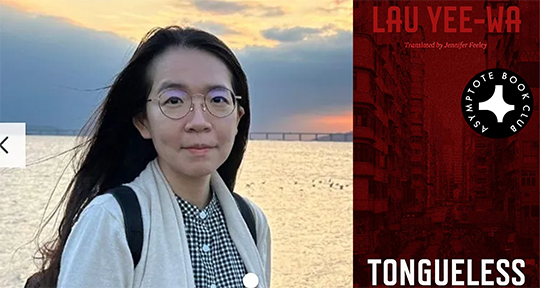Lau Yee-Wa’s Tongueless was published before the 2019 pro-democracy protests that saw two million people take to the streets in Hong Kong, but its prescient atmosphere of psychological horror and brilliantly embedded language politics anticipated the curtailing of Hong Kong’s linguistic and social liberties after 2020. Demonstrating Lau’s percipience and sensitivity, Tongueless is a timely and vital addition to the growing corpus of Hongkongese literature available in English. Jennifer Feeley’s masterful translation follows in her track record of translating titles from Hong Kong—most recently Xi Xi’s Mourning a Breast (New York Review Books, 2024), for which she was awarded a 2019 National Endowment for the Arts.
The Asymptote Book Club aspires to bring the best in translated fiction every month to readers around the world. You can sign up to receive next month’s selection on our website for as little as USD20 per book; once you’re a member, join our Facebook group for exclusive book club discussions and receive invitations to our members-only Zoom interviews with the author or the translator of each title.
Tongueless by Lau Yee-Wa, translated from the Chinese by Jennifer Feeley, Feminist Press (US) and Serpent’s Tail (UK), 2024
Allegory depends on wordplay, and Tongueless starts with its title. The two ideographs in the original Chinese title, 《失語》, stand respectively for ‘loss’ and ‘language’. Together, they can both denote aphasia, a form of brain damage that hampers speech, as well as a Chinese expression that refers to a ‘slip of the tongue’. In Jennifer Feeley’s acerbic translation of this novel by Lau Yee-Wa 劉綺華—originally published in 2019 in what the copyright page calls ‘Complex Chinese’—《失語》becomes Tongueless. Lau’s psychological story of horror and loneliness in Hong Kong transfigures the metaphorical resonance of tonguelessness—losing one’s language, or mother-tongue—into a near-literal embodiment of mutilation and physical deprivation, a bloody allegory for the silencing and violence that Lau charts through the interpersonal and institutional politics of contemporary Hong Kong society.


